In defense of Red Dead Redemption 2's realism
Red Dead Redemption 2 is the largest entertainment opening of all time, taking over $700 million dollars in its first weekend. Its popularity hasn't been without controversy.
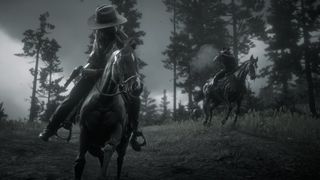
Red Dead Redemption 2, set in the closing years of the Wild West. While the myths surrounding this time period have become exaggerated and romanticised via Hollywood and other mediums, it wasn't so long ago that all historical records of life in those times has been erased. Red Dead Redemption 2's story takes place through a lens of realism-meets-romanticism, with a side order of good gameplay over historical accuracy.
That said, there's a growing chorus across commentators that Red Dead Redemption 2's gameplay errs too close on the side of realism, to the point where you can even complete chores in your gang's campsite to make people view you more favourably. I've read lamentations that the gunplay is too slow or "clunky," and even that Red Dead Redemption 2 is too big, even.
Of course, everyone is entitled to their opinion, but big entertainment releases (the world's biggest, ever, reportedly) often come with a chorus of contrarianism that seem forced and overthought. In any case, I want to express my sincere gratitude to Rockstar for taking the time to build a game world that delivers something increasingly rare in games today, that of immersion.
Immersive games are OK
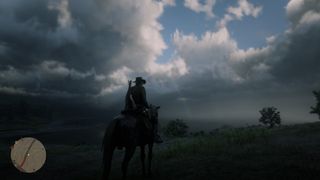
One of the biggest issues facing open world games today, for me, is diffusion. Like the heat death of the universe, open world games seem to be getting bigger and bigger, expanding exponentially, while actual good gameplay content, you know, the meat in the sandwich, simply gets spread thin. Red Dead Redemption 2 is one of the only games this generation that deliver an open world that feels truly alive, where side activities don't feel like busy work — they feel like they're part of your character's life. Other games have come close, but things like cartoony character writing hold them back from reaching the top spot. When side activities boil down to checking a tick box in a text-based menu, they feel like busy work, whereas in the case of Red Dead Redemption 2, they feel necessary and, therefore, rewarding.
Even something as mundane as ammo crafting feels like it's intrinsic to the narrative experience.
In Red Dead Redemption 2, resources are split into two meters. One regenerates over time, as normal, while another depletes more permanently. The "cores" need to be maintained with items, such as food, booze, and even cigarettes, in order for your character to perform properly. If your Dead Eye core is empty, your aiming sway will be increased, and the targeting reticle will remain dispersed for longer.
If your stamina core is low, you won't be able to sprint, and if your health core is low, you won't be able to regenerate.
There was a trend in games, for a time, where managing and maintaining your character fell by the wayside in favour of making everyone feel like super heroes. Take a bullet to the face? Just hide in a corner for five seconds, you'll be fine.
Get the Windows Central Newsletter
All the latest news, reviews, and guides for Windows and Xbox diehards.
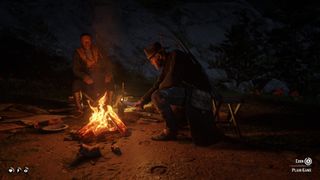
There's certainly a place for these sorts of experiences, don't get me wrong, but it seems the trend has swung back in the other direction in recent years for the sake of interactivity. Even Call of Duty now has active health replenishment, doubtless following the success of games like PlayerUnknown's Battlegrounds, where tense, mid-fight bandaging only adds to the experience. Red Dead Redemption 2 pushes interaction to the extremes, to the point where something as mundane as ammo crafting feels like it's intrinsic to the narrative experience, adding custom split points to your bullets to inflict added pain.
In other games with crafting systems, you don't actually, feel the crafting. The crafting takes place in some text-based menu, and the things you create are simply entries in a database. In Red Dead Redemption 2, they come with 3D models, animations, and intersect with other side activities like hunting and fishing, which are also represented by 3D objects with complex systems and behaviors behind them. Every aspect of the game has a purpose, and is complemented by their interactions with other systems within the game.
When you're studying animals with your binoculars, sometimes you might see deers interlocking antlers in a fight. Other times, you might see a pack of coyotes on the hunt. Examining them reveals information on how best to hunt them, to keep their hides in tact for the best selling price or for crafting purposes. Additionally, though, the game's main character, Arthur, might sketch them into his journal, which is an on-going hand-written record of the decisions and story you build up for yourself as you play. He'll also hand-sketch locations of animals onto your map, and cross off the noteworthy hunts once they've been completed.
For detractors, these features are exactly that, just features. Perhaps extraneous and unnecessary, getting in the way of "real gameplay," therein being shooting and being Clint Eastwood. Red Dead Redemption 2 just isn't that kind of game. These features interact deliberately, because they want to immerse you, they want you to lose yourself in this meticulously constructed world Rockstar has put together. They want you to think about how clean your weapons are, they want you to take care of your character's health, because they want you to care about the character. Ultimately, the story is more powerful as a result.
It's OK to not like this type of game, it's not OK to claim that it's bad design, because the truth is, you're just not into immersive games.
Rare Dead Redemption 2
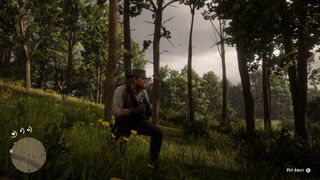
There has been a wealth of controversy over how hard Rockstar has been pushing its staff, with reports of mandatory overtime, unsympathetic bosses, and other aggressive practices. "Crunch culture," as its known, appears to be rife in the AAA industry, apparently getting progressively worse for staff in-line with the quality of games. Clearly, there's a huge demand for games as detailed as Red Dead Redemption 2, but the human cost, the sheer amount of financial risk involved, may be too great for many publishers to stomach. And that's while ignoring whether or not they should even try, from a moral standpoint.
Ultimately, the dynamism found in Red Dead Redemption 2 is the culmination of an insane amount of work and skill that is clearly in huge demand, given the sales success of the game so far. But is it feasible to expect the industry to move in that direction now? I'd say it's unlikely. It's also probable that Red Dead Redemption 2 is in such high demand simply because of how rare it is to get a game on this level.
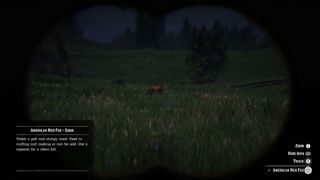
When my first horse was killed in Red Dead Redemption 2, I felt more moved by that than I have been for the elaborate plots of many recent "AAA" games. I fed that horse and groomed that horse, named that horse (Andromeda... ahem). The interactive features, that some dismiss, helped me bond with this virtual nag in a way that simply doesn't happen that often in games.
Immersion on this level rarely happens, and when it does, it's something that should be celebrated, because open world games crammed with instantaneous superhero gratification are a dime a dozen.
You can grab Red Dead Redemption 2 for $60 for Xbox One and PS4.

Jez Corden is a Managing Editor at Windows Central, focusing primarily on all things Xbox and gaming. Jez is known for breaking exclusive news and analysis as relates to the Microsoft ecosystem while being powered by tea. Follow on Twitter @JezCorden and listen to his XB2 Podcast, all about, you guessed it, Xbox!
